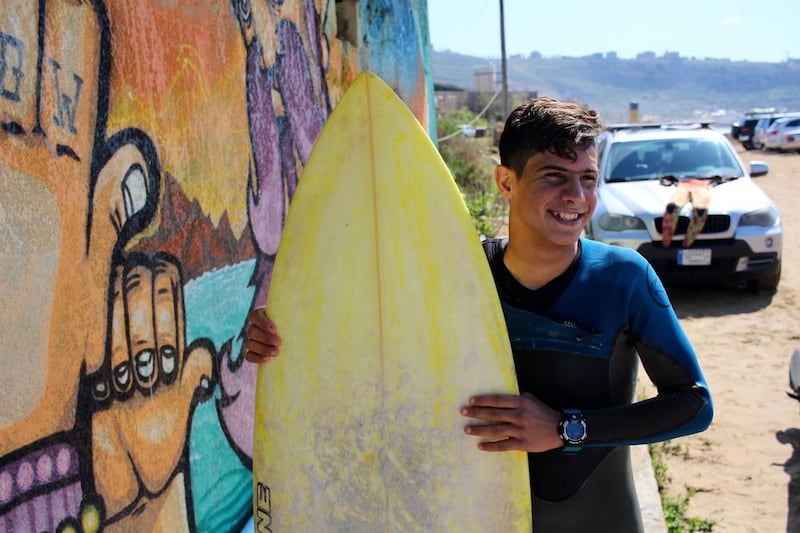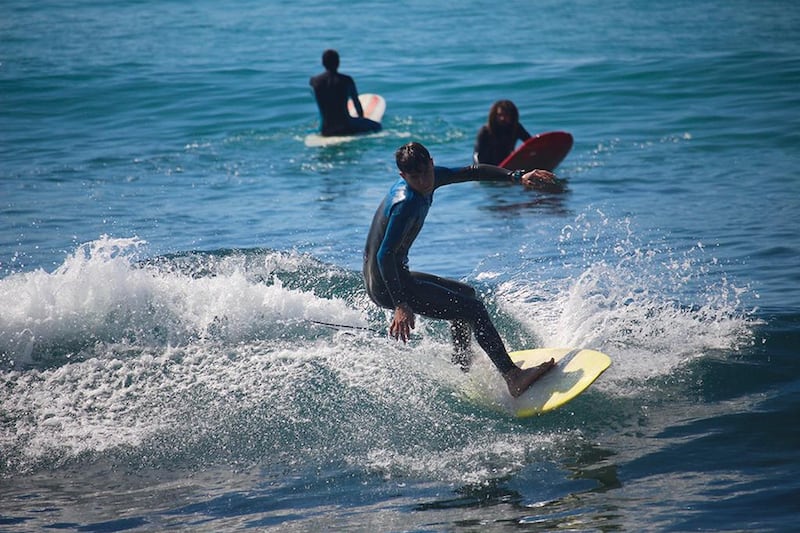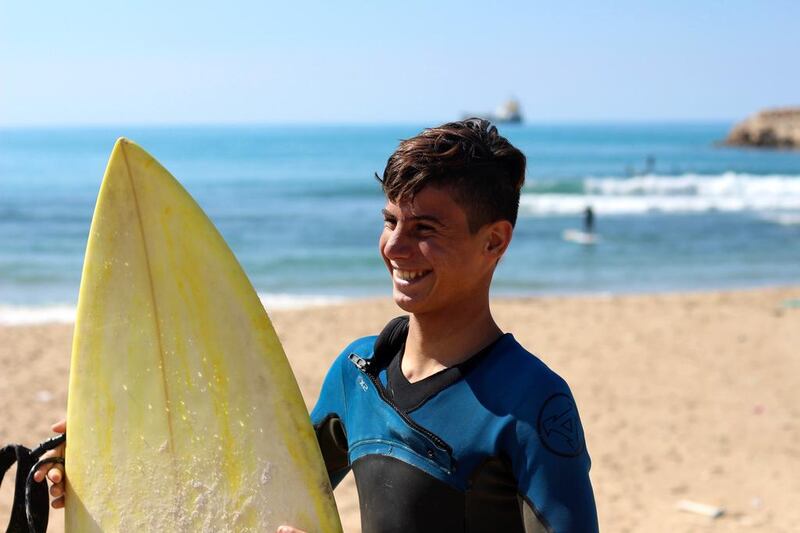JIYEH, LEBANON // For months, teenager Ali Kassem sat on the beach watching with bemusement as surfers rode the waves off the shores of Lebanon. As a young Syrian refugee from the landlocked city of Aleppo, Ali had never even heard of surfing before he saw Lebanon’s surfing community in action.
Entranced by their dances on the waves, Ali wanted to emulate them. So he took a knife to a piece of discarded styrofoam he found on the beach, carved it into the shape of a surfboard and paddled out alone into the unusually rough waves.
Ali Elamine, a pioneer of Lebanon’s nascent surf industry, happened to be pulling up to the beach with a friend as the younger Ali headed into the sea by himself. Shocked, they watched the boy to see if he really would attempt to surf without a real board or the protection of a wetsuit against the cold April waters. “We were placing bets on who was going to pull him out of the water,” Mr Elamine said.
But they were afraid he would hurt himself or worse, trying to tackle big waves without equipment, supervision or any knowledge of what he was doing. Before Ali could get too far, Mr Elamine and his friend were out of their vehicle, shouting at him to come to shore. Standing on the beach, they berated him loudly for his recklessness.
That was two years ago. Now 16, Ali is out on the water as often as possible, shredding waves with the best in Lebanon. And these days he has the luxury of a wetsuit and a real board.
In a country where refugees of Syria’s war are largely ostracised and unwanted, subjected to curfews in many places and constantly blamed for the country’s ills, Ali has been adopted by the close-knit surfing community and treated like family.
When Mr Elamine stopped Ali’s initial surfing attempt, Ali insisted that he knew how to surf from observing the others.
“I gave him a wetsuit, gave him a board and I said, ‘since you know how to surf, I want to see you surf,’” said Mr Elamine. Together, they paddled out on their boards. “He got up and caught his first wave, rode it straight into the channel. First day. Unassisted. Nobody helped him … now he’s lethal.”
Mr Elamine, a Lebanese-American who grew up in Huntington Beach, California, but now lives in Hadath, a Beirut suburb, considers “Little Ali” a younger brother and has taken him under his wing. The owner of a surf shop and school on the beach in Jiyeh, he lets Ali use his equipment and surf as much as he wants. Ali also works at the surf shop when he is not at his other job, baking manakeesh in the mornings or at school in the afternoons. Mr Elamine keeps an eye on Ali’s school grades and is quite prepared to take his surfboard away if his school work deteriorates.
Ali came to Lebanon as Syria descended into violence in 2011. Initially, he was just visiting his father, who works in Lebanon, with his mother and siblings. An older brother who remained in Syria was shot and killed in the early days of the conflict. In the fog of the war, Ali does not know whether it was government forces or rebels that killed him. To the family, his death was a sign that it was no longer safe to return to Syria.
They settled in Jiyeh, a coastal town about 30 kilometres south of central Beirut. The town’s streets are festooned with yellow Hizbollah flags and pictures of slain fighters, but is more known for its gated high-end beach resorts and a relatively consistent surf break rare along the Lebanese shore.
Ali misses the Syria of his childhood, but he wants no more to do with that painful place or its destructive conflict. When his family watches TV to catch up on news from Syria, he leaves the room. He doesn’t know what happened to his childhood home in eastern Aleppo’s heavily damaged Sha’ar neighbourhood.
“Even if the war stopped, I would go back to Syria just to visit. But I would want to stay here because it’s all about the surfing,” he said.
In surfing, Ali has found an escape and a passion, something to absorb him so he can forget about everything else — his life of uncertainty in exile, the long hours he must work to support his family, the two years of school he lost to the bureaucratic nightmare of being a refugee.
“When I moved here, I didn’t have friends or anything. I just stayed by myself all the time. But surfing helped me meet people and friends,” he said.
Surfing has given Ali a path. These days, he dreams of opening his own surf shop, renting out boards and teaching people how to carve waves. And while Lebanon’s relatively modest waves are exciting enough for him so far, he dreams of one day boarding a plane to fly off to more famous surf hotspots like California and Sri Lanka.
jwood@thenational.ae







